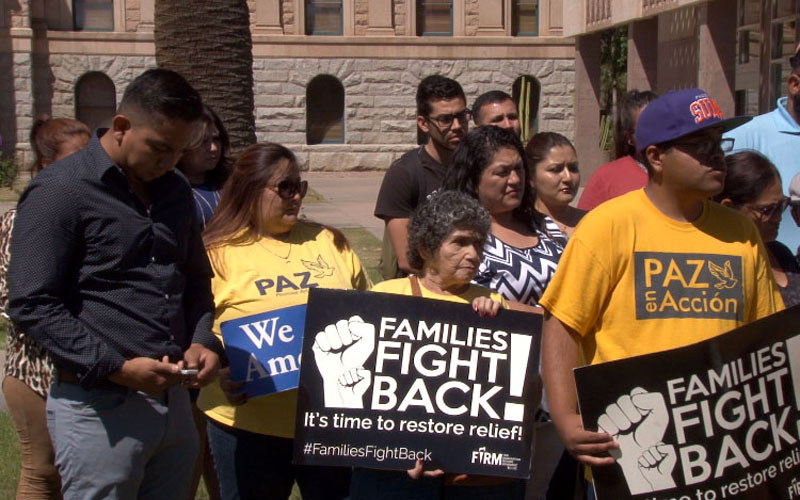
Dozens of undocumented immigrants and members of immigrant rights groups gathered at the State Capitol on Monday to share their stories about how they would be affected if DACA and DAPA are repealed. (Photo by Mauricio Casillas/Cronkite News)
Ivonne Salazar and Graciela Pacheco started praying Sunday, hours before Supreme Court justices began arguments over a controversial immigration plan that could push them and millions more out of the shadows. Or separate them from their families.
The two women gathered outside the State Capitol Monday, hoping for a decision that could end their fears of deportation and family separation. Some said they felt on edge.
“Today is a very important,” said Pacheco, 50, originally from the southern state of Oaxaca. She has spent more than half of her life in Arizona. “I’m feeling a mix of emotions right now. I’m excited but I’m also panicked.”
Salazar, 38, who cleans hotels in Phoenix, added: “My messages to the justices? I’ve been waiting for this day for more two decades now. Our fate is in their hands now.”
She has three children, all born in the U.S.
The future of Pacheco, Salazar and that of an estimated 137,000 other Arizonans – some 5 million across the United States – hung in the balance as justices began oral arguments over the United States vs. Texas, which tests whether President Obama overstepped his legal bounds in 2014 by issuing executive orders to shield from deportation millions of people in the country illegally. About 11 million people reside illegally in the United States.
Promise Arizona, an immigrant rights group, organized the rally, which included an 18-hour prayer vigil. While the Supreme Court deliberated the fate of the Deferred Action for Childhood Arrivals (DACA, also commonly referred as Dreamers) and Deferred Action for Parents of Americans (DAPA) initiatives, some families confessed they began having their own poignant discussions about what the future holds for them and their families in the weeks and months to come. A final decision is expected in June.
“We’ve talked to the kids about the possibility of having to move back to Mexico,” said Isabel Moreno, 44, “But they don’t want to go because they’ve never been there. They don’t know what Mexico is like.”
Some of the so-called Dreamers are afraid they might have to drop out of school if DACA is repealed.
“I’m proud to be a contributing member of this society, especially because 10 years ago, when I moved to the States from South Korea, I could not fathom being a law student,” said Thomas Kim, a law student at ASU.
Moreno hopes that the Supreme Court will side with them, so that she won’t have to live in constant fear of deportation.
“We need to come out of the shadows, and they need to take our rights into consideration,” Moreno said. “They don’t do that right now because we don’t have papers.”